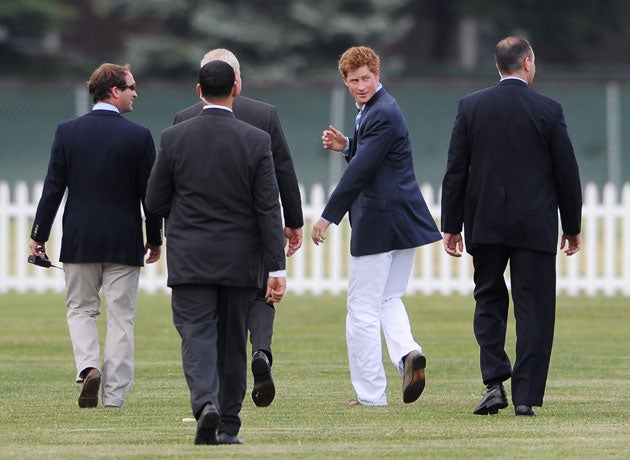Polo: Match for the plebs seeks to shed sport's elitist image
The organisers of Polo in the Park, to be screened on ITV, are chasing a different class of fan

Your support helps us to tell the story
From reproductive rights to climate change to Big Tech, The Independent is on the ground when the story is developing. Whether it's investigating the financials of Elon Musk's pro-Trump PAC or producing our latest documentary, 'The A Word', which shines a light on the American women fighting for reproductive rights, we know how important it is to parse out the facts from the messaging.
At such a critical moment in US history, we need reporters on the ground. Your donation allows us to keep sending journalists to speak to both sides of the story.
The Independent is trusted by Americans across the entire political spectrum. And unlike many other quality news outlets, we choose not to lock Americans out of our reporting and analysis with paywalls. We believe quality journalism should be available to everyone, paid for by those who can afford it.
Your support makes all the difference.When Prince Harry picked up his polo mallet in New York yesterday, it was amid surroundings fit for, well, a prince. With the sun shining down on the Manhattan turf and Hollywood stars sipping champagne on the sidelines, the Veuve Clicquot tournament brimmed with vulgar excess. But an ocean and a social world away from this, what is claimed to be first "working man's" polo tournament will take place in Britain this week.
It will not be the first attempt to popularise the game, but the organisers of the Polo in the Park tournament, which begins in London on Friday, claim to have some significant advantages over previous efforts. They have erected grandstand seating; dumbed down the rules of the game; replaced the traditional white ball with a garish pink one; and forked out £250,000 to have the international match screened on ITV – making it the first polo to be screened on terrestrial television.
They have even done the unthinkable and snubbed the Royal Family – previously regulars at polo tournaments – fearing that their presence might put off the "ordinary" sports fans they are trying to woo.
The World Polo Association (WPA), which is behind this week's event, hopes that the location – admittedly in London's less than strife-torn Fulham – will encourage city dwellers who have not watched polo before to come along, with free and reduced-price tickets available for local residents for the Sunday matches. The tournament will be the first to be played at the Hurlingham Club for 70 years: the pitches at the club, once the home of the sport, have not seen polo ponies since they were taken over for the Dig for Victory campaign in the Second World War.
"Polo has been due a makeover for a number of years," said Daniel Fox-Davies, the chairman of the WPA. "It wasn't a question of 'when', but 'how long' before one of the polo organisations took steps to rejuvenate the game and bring it in keeping with modern technology and changing social interests."
Polo in the Park will see teams from London, Mumbai, New York and Buenos Aires compete in the World Polo Series. The matches are sold out – tickets went for £35-£40 – with more than 10,000 people expected to turn out on Saturday, while a "celebrity" polo match is scheduled for Sunday. The line-up of stars playing includes the former England captain Henry Brett, Jack Kidd – the brother of model Jodie and the director of polo for the WPA – and Nina Clarkin, the world's foremost female player.
"Polo needed to shed its mysterious aristocratic heritage and adopt a new generation of polo aficionados," Mr Fox-Davies said.
While the organisers are hoping that the tournament will boost polo's popularity in the much same way that Twenty20 raised the profile of cricket, this is not the first attempt to rebrand the sport. Even the game's most ardent advocates are sceptical about the likelihood of the average man or women popping down to the pub to watch polo on a Saturday afternoon.
"To go and watch polo as a spectator sport doesn't have the cachet of going to Chelsea or wherever – you won't know the players or care whether the team in blue or red wins," said David Woodd, the chief executive of the Hurlingham Polo Association.
Polo clubs have tried to widen access for players as well as spectators, offering various sponsorship schemes for talented youngsters from less-privileged backgrounds, but admit that its reliance on horses means that polo remains a sport for the wealthy.
"There are no bones about it," said Mr Woodd. "If you haven't got any money it is difficult to be a polo player."
Join our commenting forum
Join thought-provoking conversations, follow other Independent readers and see their replies
Comments